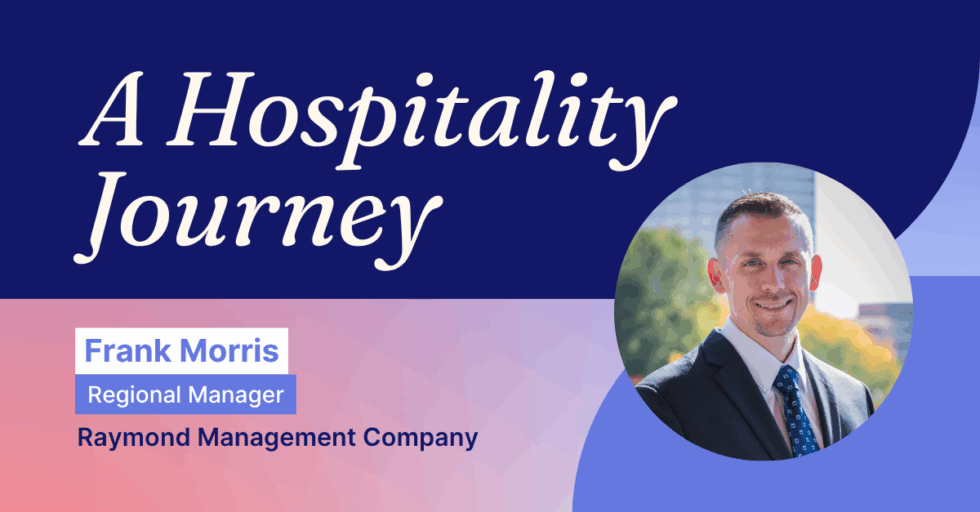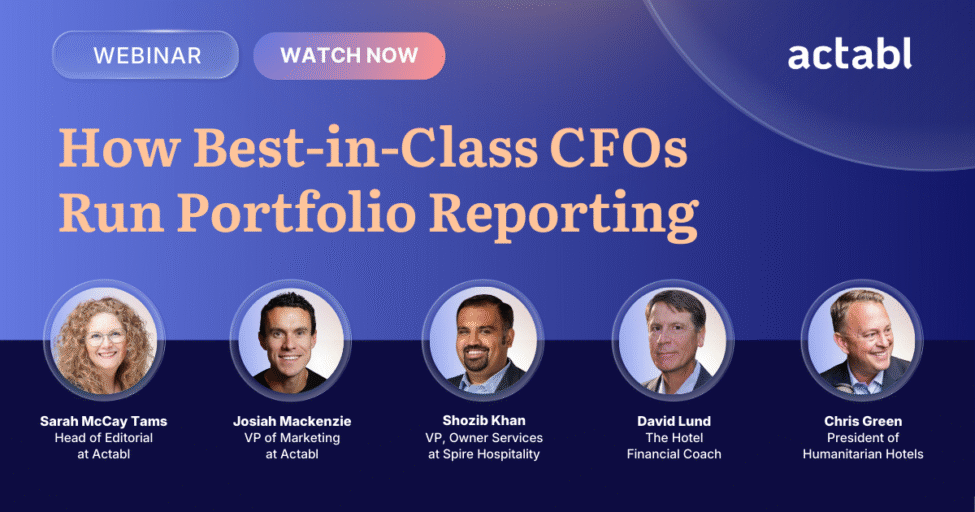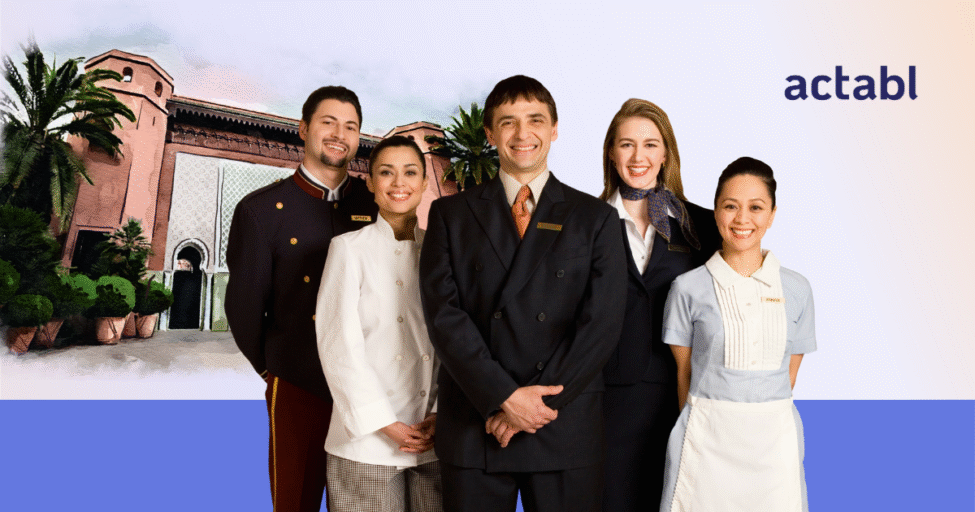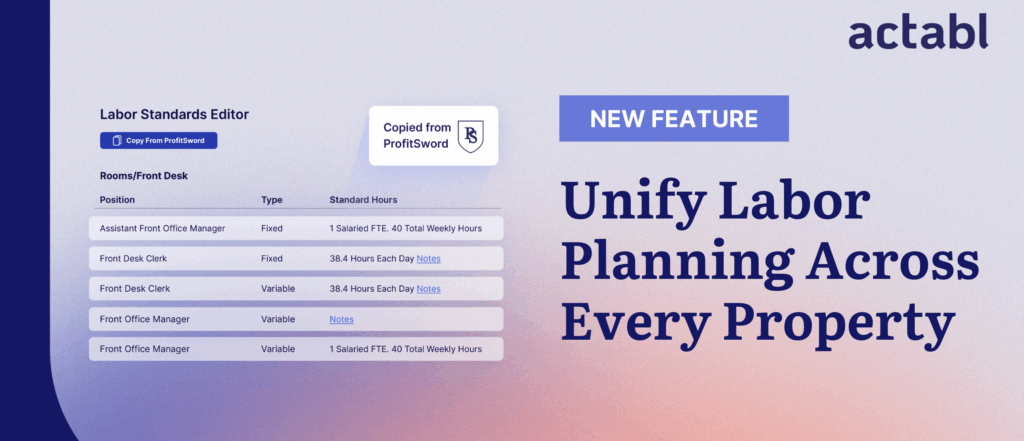
A Hospitality Journey: How Frank Morris Built a Career on Pizza, People, and Profitability
With nearly three decades in hospitality, Frank Morris has built a career grounded in growth, mentorship, and a love for the industry’s people-first culture. Today, as Regional Manager at Raymond Management Company, Frank oversees nine hotel properties while supporting profitability initiatives and guiding teams through daily challenges.
In this conversation with Actabl’s Head of Editorial, Sarah McCay Tams, he reflects on his “accidental” entry into hotels, why he has stayed, how he uses technology as a tool, and what advice he has for hoteliers looking ahead.
Sarah McCay Tams, Head of Editorial, Actabl: Frank, how did you first get into hospitality?
Frank Morris, Regional Manager, Raymond Management Company: It was an accident. I was in high school and working in a pizza restaurant; it didn’t really pay much, but I loved it. Someone suggested I try this “hotel thing,” and I had no idea what that meant.
I started working at a larger hotel in Boise in food and beverage, banquets, catering, and anything ‘restaurant’. I loved it. In the beginning, I thought, “You’re going to pay me to basically work out all day? I’m cool with that.” The pay was better, I had fun with my friends, and I felt accomplished when the day was over. I enjoyed it, and I never stopped.
Sarah: At what point did you realize it would become a long-term career?
Frank: At first, I didn’t. I figured I’d do it as long as I kept growing and had opportunities to improve. Now, almost 27 years later, that has never stopped. What keeps me here is giving back. Mentors over the years took the time to show me how they did things, and I try to do the same for the next generation. Supporting people, creating processes, and influencing how our company moves forward keeps me doing it.
Sarah: Tell us about Raymond Management Company and what makes it special.
Frank: Raymond Management started in 1978 with Jeff and Judi Raymond. They began in restaurants, then moved into hotels — Super 8s, Hampton Inns, and eventually more than a dozen different brands.
We’ve grown over the years, but what’s interesting is that no matter how large we’ve gotten, we’ve never lost who we are at the core. There’s always been talk of “how big is too big?” But the answer is: we’ve never found that ceiling.
I joined in 2011 when we had around 20 hotels. Now we’re at 36. Through that growth, people have stayed. We’ve got folks who’ve been with us 20, 30, even 40 years. That’s a testament to our culture and commitment to excellence.
Sarah: What does your role as Regional Manager look like today?
Frank: There are four regional managers, and we each support between 8–10 properties. I currently oversee nine. It’s a structure that works really well — it keeps us busy but not so overloaded that we can’t provide good support.
We also have focus areas. Mine is profitability. So, I’m the administrator and main champion for Hotel Effectiveness, but I also support purchasing and procurement.
One thing I like is that my office is in a hotel. I’m not camped out in a cubicle far from the action. Being on-site helps me stay connected to the feel and vibe of a hotel and stay current with things.
Sarah: How did Hotel Effectiveness become part of your work?
Frank: We started using it in 2018. Before that, we had an internal process built on spreadsheets. They worked for a while, but they weren’t efficient. They were subject to data errors, and they required a lot of resources to stay up to date.
Hotel Effectiveness gave us real-time metrics and reporting. I’m analytical by nature, so I adapted to it quickly. It gave me the ability to spot trends and see the data in real time. That excitement carried over as I became the administrator for the system, and we’ve driven usage to very high levels.
Sarah: You’ve made reducing overtime a focus. Why does that matter so much?
Frank: Labor is our biggest expense. For the last few years, a lot of the focus has been on trying to find efficiencies within the workplace and restructure some of our staffing models. We decided to set a goal of reducing overtime to 1% of total hours. Month after month, we’ve been able to maintain it.
Even trimming just 1% of overtime makes a huge difference across multiple properties. It adds a lot to the bottom line.
But it’s not just financial. Associates get more accurate schedules. They aren’t being pushed past their limits with too much overtime. People thrive when they have the right balance. With consistency, you can achieve balance, and we work hard to provide that.
Sarah: What does that balance mean for your associates and guests?
Frank: It makes a big difference.
If you've got a team that is well-balanced, that’s right-sized, that has enough hours, so they're not having to juggle a second job, but they're also not doing too many hours for you, then they serve the guest better.
Sarah: What advice would you give hoteliers considering new technology?
Frank: Have a strategy and stick to it. Be clear about your goals and your expectations for how the system should be used.
These tools can be overwhelming because there’s so much data. If you don’t set clear expectations, people will either get lost or just check the box without using it effectively.
My advice is: keep it simple. Getting good at the basics first gets you a long way. Once people are comfortable, you can add more. And when you do that consistently, there’s no ceiling. There’s no stopping you.
- Want to learn more about how Raymond Management Company empowers its teams and boosts results with Actabl? Read the full story here





